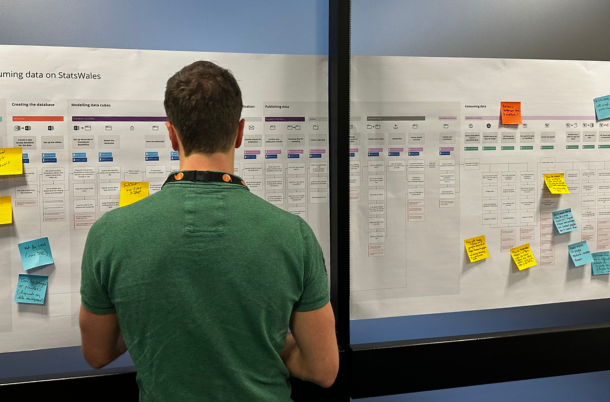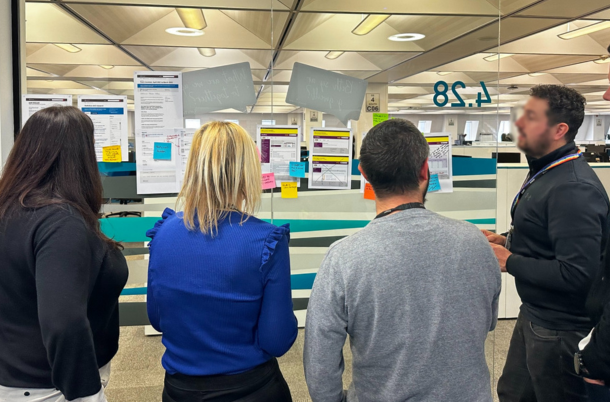The Welsh Government asked us to understand and validate the requirements for replacing their legacy data publishing platform. We identified their user and business needs, and developed a roadmap for delivering the new service.
The Welsh Government’s Knowledge and Analytical Services (KAS) is the unit which provides expert advice and insight on a range of policy areas. KAS works closely with Welsh Government departments and external partners to produce evidence-based research and analysis to inform decision-making. As a part of this work, they manage StatsWales, the official data publishing service for the Welsh Government. The service is used for collecting, processing and publishing statistical data about Wales. It provides a wide range of statistical information, covering topics such as population, health, education, the economy, and the environment.
StatsWales is used by policy-makers, researchers, businesses and the public to understand trends, identify challenges and inform decisions. The Welsh Government uses it to understand the needs of its citizens, monitor progress towards policy goals and allocate resources.
It has been almost a decade since the second incarnation of the StatsWales digital service went live. While it was cutting-edge at the time, the service hasn’t been improved or updated over the subsequent years. This meant that while both its users' needs and technology has continued to evolve, the original service has struggled to remain relevant in both areas. Consumers struggle to find or manipulate the data they want and publishers are forced to work around outdated publishing workflows.
KAS created an initial list of the high-level requirements for what a new Welsh data publishing service would need to deliver. They asked us to undertake a Discovery phase to rigorously explore and understand how the current service is being used, how well it is meeting the needs of its users and to refine the requirements for creating a better service.
Over a total of 8 weeks we gained a deep understanding of the existing service as well as any relevant teams and processes involved, and looked at similar products in the market. We mapped and visualised our findings to help communicate them clearly and succinctly with the team and stakeholders.
We conducted 20 hours of remote research sessions with 31 users of StatsWales. These were internal users who publish data and maintain the service and external users who consume the data. Sessions were in the format of semi-structured interviews and user-driven walkthroughs of the StatsWales admin user interface and public website.
In addition, we launched a bilingual satisfaction survey to help benchmark the performance of the service across both English and Welsh speakers.

While the KAS team were experts in their areas of statistics and analysis, they were new to the agile Discovery approach. We welcomed KAS colleagues to observe and participate in our processes and meetings throughout the project. Being careful to explain all of the techniques that we used and their values. We provided agile coaching to familiarise colleagues with our processes and methods.
We had am apprentice from KAS shadow our user research lead, so they could learn about user research methods and best practices for gathering and analysing research data. We also invited the broader KAS team to an in-person design ideation workshop at their offices in Cardiff. They immediately saw the benefits of our in-person collaborative approach – it was also the first time several colleagues had met face to face following the pandemic.
“[This was a] valued opportunity to reflect on what we deliver” Stakeholder feedback from a collaborative workshop, Welsh Government
A new challenge for Marvell was to ensure that all our research could be done in either English or Welsh. We made sure that we had access to Welsh interpreters for conducting user research in Welsh. We also liaised with translators to make sure that a user survey published on the site was available in both Welsh and English, as well as user recruitment materials and other artefacts.

We identified that the majority of the initial business requirements were validated by genuine user needs, and the Discovery provided insight as to why they were required and their expected outcomes. We also found that some business requirements weren’t actually needed by users, and could be de-prioritised. We even identified some new user needs that hadn’t been captured before.
Our analysis also found that data consumers needed the new StatsWales service to make data and metadata easy to access and find. They needed to be able to manipulate and personalise the dataset of their choice. And be able to understand the approach for collecting the data and the narrative behind it.
Other key findings were that data publishers wanted to:
We provided KAS with a clear direction of travel for replacing the existing StatsWales service. We produced evidence to support this and used the outcomes of our research to validate, inform and prioritise the requirements for the new service. Based on this, we created a high-level delivery strategy in several phases, according to the government digital service development framework and provided an estimate of the cost and duration of the required work.
“Marvell have provided peace of mind that we needed to do this discovery – especially to senior stakeholders. If there was any doubt before, there isn’t now, from the sheer volume of research that has come out of it.” Stakeholder, Welsh Government
KAS adopted all of our recommendations, commissioning a new replacement service to be delivered. We’re continuing to work with them to deliver that service through its Alpha phase.
The new service will make Welsh statistical data more easily available and accessible to its users. We’re excited to help develop a service that publishes timely, high-quality data that will improve decision-making and improve life in Wales.
Whether you’re ready to start your project now or you just want to talk things through, we’d love to hear from you.